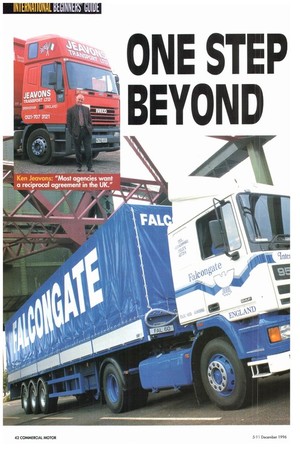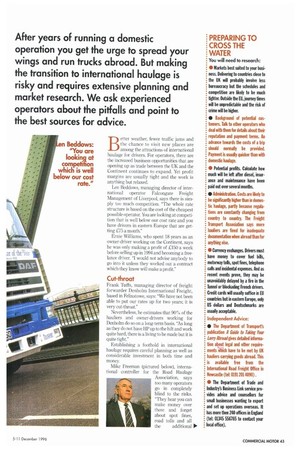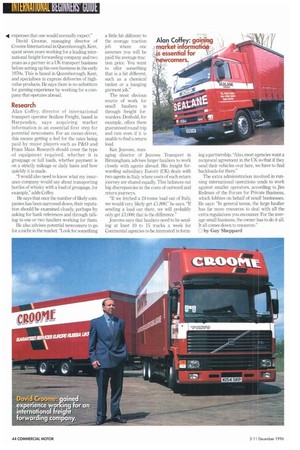NE STEP YOND
Page 44

Page 45

Page 46

If you've noticed an error in this article please click here to report it so we can fix it.
After years of running a domestic operation you get the urge to spread your wings and run trucks abroad. But making the transition to international haulage is risky and requires extensive planning and market research. We ask experienced operators about the pitfalls and point to the best sources for advice.
Better weather, fewer traffic jams and the chance to visit new places are among the attractions of international haulage for drivers. For operators, there are the increased business opportunities that are opening up as trade between the UK and the Continent continues to expand, Yet profit margins are usually tight and the work is anything but relaxed,
Len Beddows, managing director of international operator Falcongate Freight Management of Liverpool, says there is simply too much competition. "The whole rate structure is based on the cost of the cheapest possible operator. You are looking at competition that is well below our cost rate and you have drivers in eastern Europe that are getting £75 a month."
Ernie Williams, who spent 18 years as an owner-driver working on the Continent, says he was only making a profit of £150 a week before selling up in 1994 and becoming a freelance driver. "I would not advise anybody to go into it unless they worked out a contract which they know will make a profit."
Cut-throat
Frank Tuffs, managing director of freight forwarder Denbolin International Freight, based in Felixstowe, says: "We have not been able to put our rates up for two years; it is very cut-throat"
Nevertheless, he estimates that 90% of the hauliers and owner-drivers working for Denholm do so on a long-term basis. "As long as they do not have HP up to the hilt and work quite hard, there is a living to be made but it is quite tight."
Establishing a foothold in international haulage requires careful planning as well as considerable investment in both time and money.
Mike Freeman (pictured below), international controller for the Road Haulage Association, says too many operators go in completely blind to the risks. "They hear you can make money over there and forget about spot fines, road tolls and all
the additional ■ 40 expenses that one would normally expect."
David Croome, managing director of Croome International in Queenborough. Kent, spent seven years working for a leading international freight forwarding company and two years as a partner in a UK transport business before setting up his own business in the early 1970s. This is based in Queenborough, Kent, and specialises in express deliveries of highvalue products. Ile says there is no substitute for gaining experience by working for a company that operates abroad.
Research
Alan Coffey, director of international transport operator Sealane Freight, based in Harpenden, says acquiring market information is an essential first step for potential newcomers. For an owner-driver. this means getting a feel for the rates being paid by major players such as MO and Frans Maas. Research should cover the type of equipment required, whether it is groupage or full loads, whether payment is on a strictly mileage or daily basis and how quickly it is made.
"I would also need to know what my insurance company would say about transporting bottles of whisky with a load of groupage, for example," adds Coffey.
He says that once the number of likely companies has been narrowed down, their reputation should be examined closely, perhaps by asking for bank references and through talking to one or two hauliers working for them.
He also advises potential newcomers to go for a niche in the market. "Look for something a little bit different to the average traction job where one assumes you will be paid the average traction price. You want to offer something that is a bit different, such as a chemical tanker or a hanging garment job."
The most obvious source of work for small hauliers is through freight forwarders. Denhold, for example, offers them guaranteed round trip and rate even if it is unable to find a return load.
Ken Jeavons, managing director of Jeavons Transport in Birmingham, advises larger hauliers to work closely with agents abroad. His freight forwarding subsidiary Eurotir (UK) deals with two agents in Italy where costs of each return journey are shared equally. This balances out big discrepancies in the costs of outward and return journeys.
"If we fetched a 24-tonne load out of Italy, we would very likely get 1:1,800," he says. "If sending a load out there, we will probably only get J.:1,000; that is the difference."
Jeavons says that hauliers need to be sending at least 10 to 15 trucks a week for Continental agencies to be interested in form
ing a partnership. "Also, most agencies want a reciprocal agreement in the UK so that if they send their vehicles over here, we have to find backloads for them."
The extra administration involved in running international operations tends to work against smaller operators, according to Jim Redman of the Forum for Private Business, which lobbies on behalf of small businesses. He says: "In general terms, the large haulier has far more resources to deal with all the extra regulations you encounter."For the average small business, the owner has to do it all. It all comes down to resources."
by Guy Sheppard








































































































